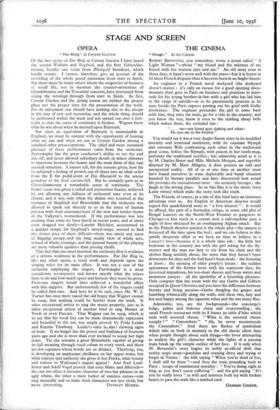STAGE AND SCREEN
OPERA
"The Ring" at Covent Garden OF the two cycles of Der Ring at Covent Garden I have heard the second Walltiire and Siegfried, and the first Glitterdom- merung, besides one scene from Rheingold broadcast, which hardly counts. I cannot, therefore, give an account of the unfolding of the whole grand panorama from start to finish. But there must be many others whom the exigencies of business or social life, not to mention the counter-attractions of Glyndebourne and the Toscanini concerts, have prevented from seeing the tetralogy through from start to finish. In fact, Covent Garden and the spring season are neither the proper place nor the proper time for the presentation of the work. For its enjoyment one should have nothing else to do, except in the way of rest and recreation, and the whole thing should be performed within the week and not spread out over a fort- night so that the sense of continuity is broken. Wagner knew what he was about when he insisted upon Bayreuth.
But since an equivalent of Bayreuth is unattainable in England, we must be content with the opportunity of hearing what we can and when we can at Covent Garden among a hundred other preoccupations. The chief and most sustained pleasure of these performances came from the orchestra. Furtwangler has the great conductor's ability to see the end afar off, and never allowed subsidiary details or minor climaxes to intervene between the hearer and the main form of this vast musical structure. I cannot tell, for the reasons given, how far he achieved a feeling of growth out of chaos into an ideal order from the E flat pedal-point of Das Rheingold to the serene grandeur of the final curtain-fall. But he certainly gave us in Gotterdeinunerung a remarkable sense of continuity. The horns' scene was given a veiled and mysterious beauty, achieved by not allowing any fullness of orchestral tone even at its climax, and it was only when the drama was resumed at the entrance of Siegfried and Briinnhilde that the orchestra was allowed to speak out directly to us in the tones of human passion with their announcement of the new and tender theme of the Valkyrie's womanhood. If the performance was less exciting than some we have heard in recent years, and at times even dragged too slowly—Lauritz Melchior, accustomed to a quicker tempo for Siegfried's sword-songs, seemed to find the slower pace of them difficult—there was rarely any sense of flagging energy, and the long steady view of whole acts, indeed of whole evenings, and the general beauty of the playing are more valuable qualities than passing thrills.
This fact that one must mention the orchestra first is evidence of a serious weakness in the performances. For Der Ring is, like any other opera, a vocal work and depends upon the singing voice for its main effect. It was not a case of the orchestra outplaying the singers. Furtwangler is a most considerate accompanist and knows exactly what the voices have to do and how much space and latitude they must be given. First-rate singers would have achieved a wonderful effect with this support. But unfortunately few of the singers could be called first-rate. And here let it be said, since Mr. W. J. Turner has once more raised the old bogey that Wagner cannot be sung, that nothing could be further from the truth. It takes exceptional artists to sing the music properly, just as it takes exceptional artists of another kind to sing Mozart or Verdi or even Puccini. That Wagner can be sung, which is to say that his vocal line can be made dramatically expressive and beautiful to the ear, was amply proved by Frida Leider and Kerstin Thorborg. Leider's voice is, alas ! showing signs of wear. It no longer has the power and brilliancy of fourteen years ago and she is more than ever inclined to scoop her high, notes. Yet she remains a great Briinnhilde capable of giving its full meaning through vocal colour to every word, and there are few sopranos whose words are so distinct. Thorborg, too, is developing an unpleasant shrillness on her upper notes, but what majesty and authority she gives to her Fricka, what beauty and sorrow to Waltraute's urgent appeal ! And Karl Lauf-. Witter and Adolf Vogel proved that even Mime and Alberich— the one too often a tiresome chatterer of two-bar phrases in an
ugly whine, the other a mere barker of toneless curses can sing musically and so make their characters not less vivid, but










































 Previous page
Previous page